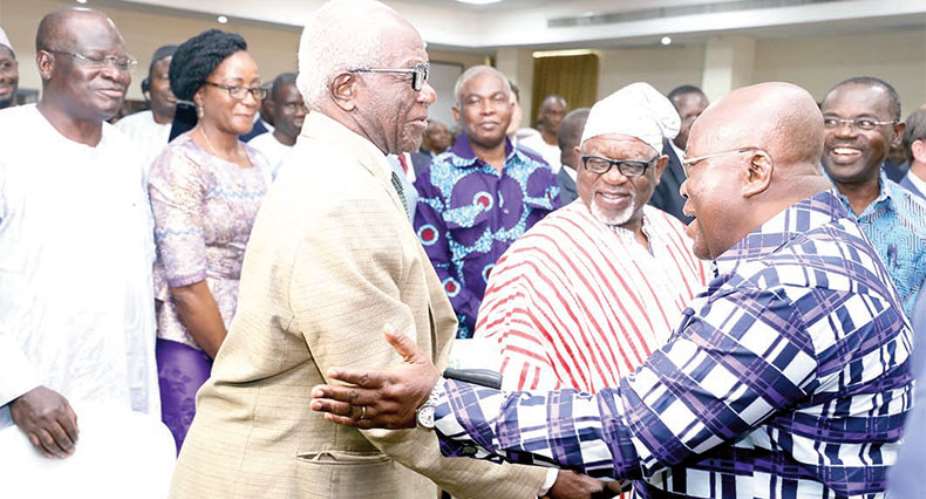President Akufo-Addo shaking hands with Erasmus Kwabla Kalitsi (left), a retired CEO of VRA after the opening session of the 12th West Africa Power Poll General Assembly in Accra
President Akufo-Addo shaking hands with Erasmus Kwabla Kalitsi (left), a retired CEO of VRA
after the opening session of the 12th West Africa Power Poll General Assembly in Accra
President Akufo-Addo believes the lack of political will on the part of African leaders has slowed down the process of integration in the West African sub-region.
Whilst the European Union (EU) is central to the lives of most Europeans, he said, “The Economic Community of West African States (ECOWAS) continues to be somewhat peripheral to the lives of most West Africans. It is not for the lack of plans or even rules and regulations, but it is simply that the political will to make integration real has been less evident than in Europe.”
The president made the observation at the 12th West African Power Pool (WAPP) General Assembly meeting in Accra yesterday.
President Akufo-Addo indicated, “Our problem over the years, I suggest, has been leadership,” noting with emphasis, “We need leadership that is focused on the region, and not on individual countries.”
He pointed out, “The European Union took off because the political will to make it work was there.”
President Akufo-Addo therefore stressed the belief that “once the political will is evident, we can then work together to make out of ECOWAS a true regional community and market.”
He said there is the need to ensure access to affordable, reliable, sustainable and modern energy for all, which is in line with the ultimate objective of the regional power pool.
“We find ourselves in a region well-endowed with diverse energy resources to support domestic, industrial and commercial uses that will eventually lead to the socio-economic development of the region,” he observed.
These resources, according to President Akufo-Addo, are unevenly distributed and that “it is through regional co-operation and integration of the regional electricity network, through power pooling and cross-border interconnection, that the benefits of electricity can be made available to a broad majority of the citizens of West Africa.”
He was of the conviction that “the availability and use of electricity will greatly influence how rapidly West African countries are able to increase their agricultural and industrial productivity, provide safe drinking water, achieve rapid economic development and employ information and communication technology to become increasingly integrated into the global marketplace.”
In that respect, he was convinced, “Producing reliable and affordable electricity is crucial to the development of the region,” whilst quoting the President of the African Development Bank, Akinwumi Adesina, who said, “If African leaders want power, they must provide power.”
He insisted, “The delivery of stable, affordable power is critical to the success of our efforts towards the development of West Africa.”
Facts On File
Since 2000, economic growth in West Africa has been rapid, and so has electricity consumption.
In most West African countries, the annual growth in demand for electricity is estimated at 10%.
This means that for every seven years, the sub-region needs to double its investment in electricity infrastructure.
Investment in the energy sector has been termed as “impact investment,” in that it ensures the delivery of financial and social returns that have the potential to address important challenges, such as reduction of poverty and improvement of the lives of people.
In West Africa, fortunately, through the ECOWAS Energy Protocol, efforts have been made to resolve the regulatory and political barriers constraining investment in electricity supply, and inadequate infrastructure along the electricity value chain.





 Burkina Faso expels French diplomats for 'subversive activities'
Burkina Faso expels French diplomats for 'subversive activities'
 GOIL reduces petrol price by 29 pesewas, sells GHC14.70 per litre
GOIL reduces petrol price by 29 pesewas, sells GHC14.70 per litre
 The disrespect towards security is terrible; we can do better — Atik Mohammed co...
The disrespect towards security is terrible; we can do better — Atik Mohammed co...
 Starlink to cease connection in Ghana, other “unavailable” countries on April 30...
Starlink to cease connection in Ghana, other “unavailable” countries on April 30...
 MMCEs, DCEs and Regional Ministers must be elected to reduce political interfere...
MMCEs, DCEs and Regional Ministers must be elected to reduce political interfere...
 National Cathedral: ‘Nonsense; you take taxes from broke Ghanaians to dig a clum...
National Cathedral: ‘Nonsense; you take taxes from broke Ghanaians to dig a clum...
 April 18: Cedi sells at GHS13.59 to $1, GHS13.01 on BoG interbank
April 18: Cedi sells at GHS13.59 to $1, GHS13.01 on BoG interbank
 We must harness the collective power and ingenuity of female leaders to propel o...
We must harness the collective power and ingenuity of female leaders to propel o...
 Saglemi Housing Project will not be left to rot – Kojo Oppong Nkrumah
Saglemi Housing Project will not be left to rot – Kojo Oppong Nkrumah
 Asantehene commends Matthew Opoku Prempeh for conceiving GENSER Kumasi Pipeline ...
Asantehene commends Matthew Opoku Prempeh for conceiving GENSER Kumasi Pipeline ...
